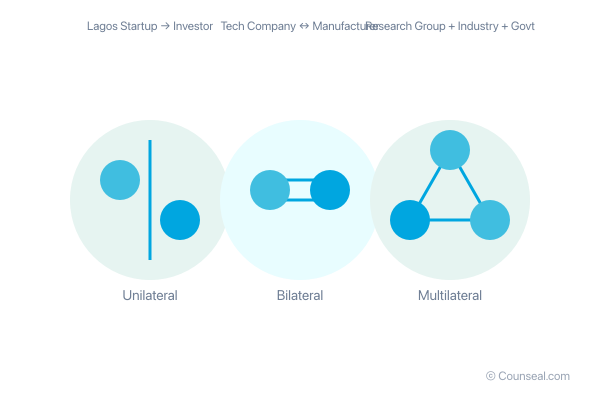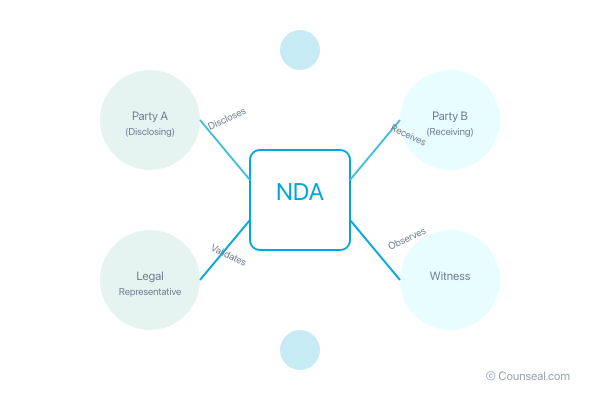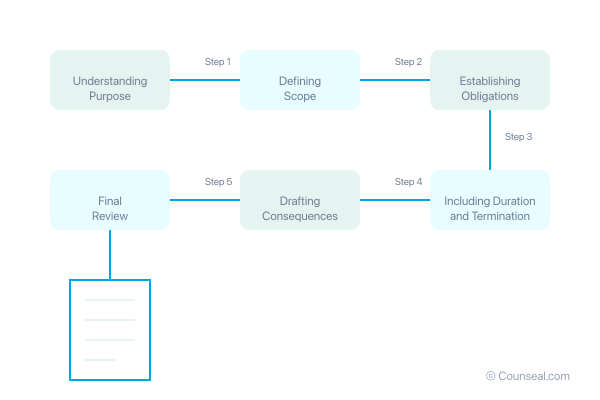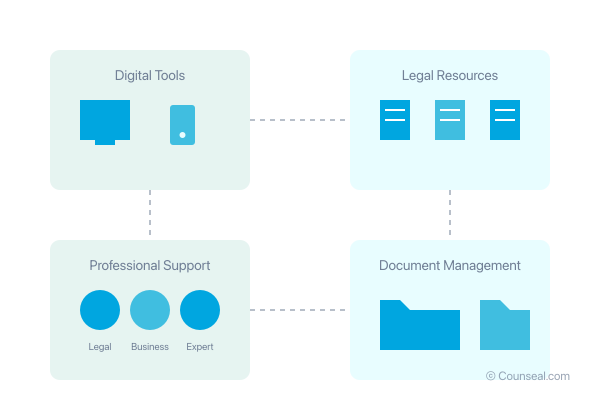How to Draft a Solid Non-Disclosure Agreement (NDA)

by Counseal Team
Updated April 17, 2025

In Nigeria’s dynamic business landscape, protecting your intellectual property and trade secrets is paramount. Whether you’re a tech startup in Lagos or a family business in Ibadan, a well-crafted Non-Disclosure Agreement (NDA) serves as your first line of defence against information leaks and intellectual property theft.
In Nigeria’s dynamic business landscape, protecting your intellectual property and trade secrets is paramount. Whether you’re a tech startup in Lagos or a family business in Ibadan, a well-crafted Non-Disclosure Agreement (NDA) serves as your first line of defence against information leaks and intellectual property theft.
According to the International Association for the Protection of Intellectual Property, businesses that effectively implement NDAs reduce their risk of intellectual property theft by up to 40%. This statistic underscores why NDAs have become essential tools for Nigerian entrepreneurs seeking to protect their innovations while fostering trust in business relationships.
Overview of Key Elements
A comprehensive NDA comprises several crucial components that work together to protect your confidential information. Let’s examine each element in detail.
1. Definition of Confidential Information
The cornerstone of any NDA is its clear definition of what constitutes confidential information. This may include:
- Business strategies and plans
- Customer lists and data
- Proprietary software and algorithms
- Marketing strategies and campaigns
- Financial information
- Trade secrets and manufacturing processes
2. Obligations of the Receiving Party
Once confidential information is shared, the receiving party must understand their responsibilities. These typically include:
- Maintaining strict confidentiality
- Using the information only for specified purposes
- Implementing reasonable security measures
- Returning or destroying confidential materials when requested
- Reporting any unauthorized disclosures
3. Duration of the Agreement
The duration clause must balance protection with practicality. Consider factors such as:
- Industry standards and norms
- The nature of the confidential information
- Market dynamics and competition
- Regulatory requirements
What is an NDA?
An NDA is a legally binding contract between parties that outlines how confidential information should be handled and protected. It serves as a crucial tool for businesses operating in Nigeria’s competitive market environment.

Types of NDAs
Unilateral NDA
Most common in scenarios where one party shares confidential information with another, such as:
- Startup pitches to investors
- Client-vendor relationships
- Employee agreements
Bilateral NDA
Used when both parties exchange confidential information, typical in:
- Joint ventures
- Mergers and acquisitions
- Strategic partnerships
Multilateral NDA
Involves three or more parties sharing confidential information, common in:
- Complex business transactions
- Industry collaborations
- Research partnerships
Importance of NDAs
Protecting Sensitive Information
NDAs create a legal framework for safeguarding crucial business information. In Nigeria’s growing tech and innovation sector, this protection is particularly vital for:
- Intellectual property rights
- Trade secrets
- Customer data
- Business methodologies
Building Trust in Business Relationships
NDAs foster confidence between parties by:
- Establishing clear expectations
- Creating legal accountability
- Demonstrating professional commitment
- Facilitating open communication
Key Components of an NDA
Parties Involved
Clear identification of all parties is crucial, including:
- Full legal names and addresses
- Business registration details
- Roles and responsibilities
- Authorized representatives

Definition of Confidential Information
Specify exactly what information falls under protection:
- Technical specifications
- Business processes
- Financial data
- Market strategies
- Customer information
Obligations of the Receiving Party
Detail specific responsibilities:
- Information handling procedures
- Security measures
- Permitted uses
- Disclosure restrictions
- Return or destruction protocols
Term and Termination
Establish clear timeframes and conditions:
- Duration of confidentiality obligations
- Circumstances for early termination
- Post-termination responsibilities
- Survival clauses
Consequences of Breach
Outline specific remedies and penalties:
- Monetary damages
- Injunctive relief
- Legal proceedings
- Dispute resolution mechanisms
Step-by-Step Guide to Drafting an NDA
1. Understanding the Purpose
Before drafting, clearly identify:
- What needs protection
- Why confidentiality is necessary
- The scope of protection needed
- Potential risks and vulnerabilities
2. Defining the Scope
Carefully outline:
- Types of information covered
- Exclusions from confidentiality
- Geographical limitations
- Time restrictions
3. Establishing Obligations
Detail specific requirements:
- Security measures
- Permitted uses
- Disclosure protocols
- Reporting requirements

4. Including Duration and Termination
Specify:
- Term length
- Renewal conditions
- Termination triggers
- Post-termination obligations
5. Drafting Consequences
Outline:
- Breach definitions
- Available remedies
- Enforcement procedures
- Dispute resolution methods
Common Mistakes to Avoid
Ambiguous Language
Prevent misunderstandings by:
- Using clear, specific terms
- Defining technical terminology
- Avoiding vague phrases
- Maintaining consistency throughout
Inadequate Scope
Ensure comprehensive coverage by:
- Clearly defining protected information
- Including all relevant parties
- Addressing all potential uses
- Considering future scenarios
Lack of Specificity
Strengthen your NDA by:
- Providing detailed examples
- Including specific procedures
- Defining clear timelines
- Outlining exact requirements
Tools and Resources
Online Resources
Valuable tools for NDA drafting:
- Legal document platforms
- Template libraries
- Digital signature services
- Contract management software

Professional Support
Consider engaging:
- Legal counsel
- Business advisors
- Industry experts
- Document specialists
Conclusion
A well-drafted NDA is essential for protecting your business interests in Nigeria’s competitive market. By following these guidelines and avoiding common pitfalls, you can create an effective agreement that safeguards your confidential information while fostering strong business relationships.For more expert guidance on legal documentation and business protection strategies, visit counseal.com/start.





